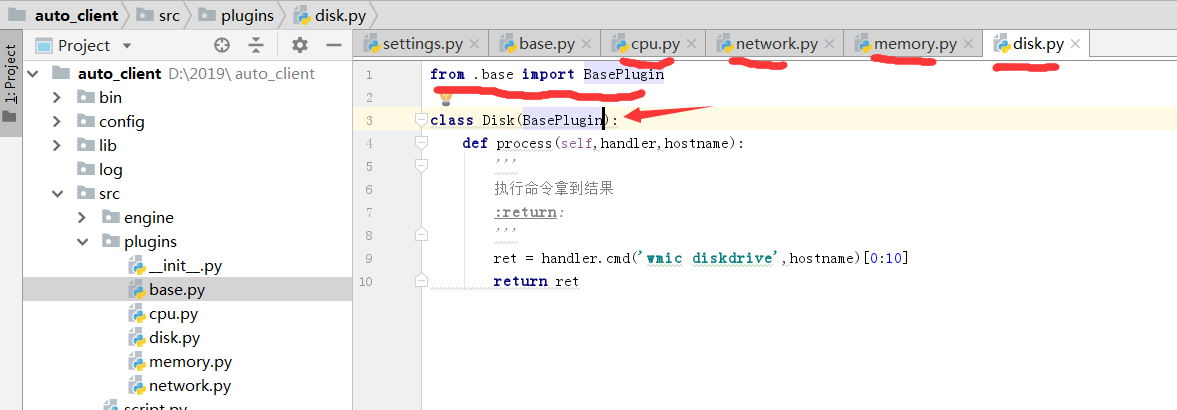判断系统因为是公用的方法,所有要写基类方法使用,首先在插件中创建一个基类

将插件文件继承基类

思路是创建基类使用handler.cmd ,命令去获取系统信息,然后进行判断,然后去执行 磁盘 ,cpu,网卡,内存等信息的收集;
基类代码:
class BasePlugin: def get_os(self,handler,hostname): os = handler.cmd("查询操作系统的命令",hostname) # return os return 'win32' def process(self,handler,hostname): os = self.get_os(handler,hostname) if os == 'win32': #测试判断执行win32 return self.win(handler,hostname) else: return self.linux(handler,hostname) def win(self,handler,hostname): #约束派生类必须实现win方法 raise NotImplementedError('handler() must Implemented.') def linux(self,handler,hostname): #约束派生类必须实现Linux方法 raise NotImplementedError('handler() must Implemented.')
disk.py ,cpu.py,memory.py,network.py 代码;
from .base import BasePlugin class Disk(BasePlugin): def win(self,handler,hostname): ''' 执行命令拿到结果磁盘 :return: ''' print("执行win方法") ret = handler.cmd('wmic diskdrive',hostname)[0:10] return ret def linux(self,handler,hostname): ''' 执行命令拿到结果磁盘 :return: ''' print("执行Linux方法") ret = handler.cmd('df -h',hostname)[0:10] return ret
from .base import BasePlugin class Memory(BasePlugin): def win(self,handler,hostname): ''' 执行命令拿到结果-内存 :return: ''' print("执行win方法") ret = handler.cmd('wmic memphysical list brief',hostname)[0:10] return ret def linux(self,handler,hostname): ''' 执行命令拿到结果-内存 :return: ''' print("执行Linux方法") ret = handler.cmd('free',hostname)[0:10] return ret
from .base import BasePlugin class CPU(BasePlugin): def win(self,handler,hostname): ''' 执行命令拿到结果-cpu :return: ''' print("执行win方法") ret = handler.cmd('wmic cpu',hostname)[0:10] return ret def linux(self,handler,hostname): ''' 执行命令拿到结果-cpu :return: ''' print("执行Linux方法") ret = handler.cmd('wmic cpu',hostname)[0:10] return ret
from .base import BasePlugin class Network(BasePlugin): def win(self,handler,hostname): ''' 执行命令拿到结果-网卡 :return: ''' print("执行win方法") ret = handler.cmd('ipconfig',hostname)[0:10] return ret def linux(self,handler,hostname): ''' 执行命令拿到结果-网卡 :return: ''' print("执行Linux方法") ret = handler.cmd('ifconfig',hostname)[0:10] return ret
最后测试执行结果
